
The Nomad is a series of stories, fascinations, encounters, observations, experiences, joy of the moments by me, Ulrike Reinhard – all around my travels. Stay tuned!
Ulrike Reinhard is The Nomad 🙂
Thula Thula is Zulu and means peace and tranquility.
And in Zululand, in the province of Kwa-Zulu Natal, South Africa, Thula Thula is the name of a private game reserve. Thula Thula takes pride in tracing back its origin to the private hunting grounds of King Shaka, founder of the Zulu Empire in the late 17 hundreds. This meanwhile 6000 ha big wildlife reserve was established in 1911 and has been operational as Thula Thula under the lead of Lawrence Anthony since 1998. Lawrence had bought the first land in the mid 1990. Elephants had never been part of his plan, but in 1999 he received a call from a conservation organisation which asked whether he would be willing to take on a herd of seven animals which had escaped from every enclosure they had ever been in, wreaking havoc across KwaZulu-Natal, and were considered highly dangerous. Realising that the elephants would be shot if he declined, Anthony agreed to give them a home. A true love story began.
I didn’t know about Thula Thula, even though I love elephants and have been close to them during my years in India. Litte Babu whom I saw for the first time when he was one day old and Vatsala, the grand lady of the working elephants at Panna National Park, were my favourites in this herd of 17. Vatsala is over 100 years old and every now and then we had our conversations. This might sound silly yet I’d insist that there was communication between this mighty old elephant lady and me. Clear communication.
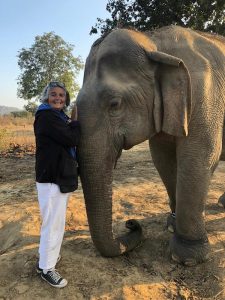
The game reserve grabbed my attention when I saw this book in a tiny beautiful bookstore in Kalk Bay, south of Cape Town, South Africa.
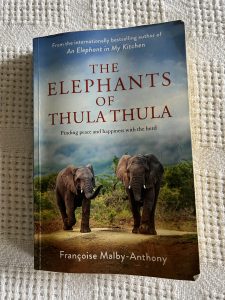
I bought the book because I loved the book cover. It was so authentic and immediately “talked” to me. The same evening I started reading – Francoise (the widow of Lawrence Anthony) was telling stories about her elephant “family”, stories which resonated with me because I could so easily relate to them. I had experienced some of what she was writing in my encounters with these gentle giants. While reading, I decided to send Francoise an email asking if I could come for a visit and write a story. She replied almost instantly and we emailed back and forth and set a date.
My trip to Thula Thula in Zululand was scheduled and I was very excited.
Before you dive into my Thula Thula story I want you to watch this short video and simply enjoy the pure joy of the Thula Thula elephants having a bath in the Mine Dam after “dancing” down the gumtree hills …. see how 28 elephants turn a dam into a whirl pool.
MAYBE THE MESSAGE IS IN THE WIND
In our noisy cities we tend to forget the things our ancestors knew on a gut level: that the wilderness is alive, its whispers are there for all to hear – and to respond to.
This is a qoute by Lawrence Anthony, who took over Thula Thula in 1999.
After four nights in Durban, a city I couldn’t really connect to, I was completely excited to go to Thula Thula. I took an early morning bus from Durban’s main bus station. The bus went all the way up to Bulawajo in Zimbabwe – in total 1500 km and 20 hours on the road. For me it was only a two hour ride along the Indian Ocean and we turned inland at Richards Bay. I hopped of the bus in the small town of Empangeni, which is the closest town to Thula Thula – this is where the Thula Thula staff goes shopping and get everything they need. Nothing special or exciting there – it’s just the gateway to Thula Thula. Andrew, one of the Thula Thula guides and as it turned out a true elephant “connaisseur”, picked me up in Empangeni and we drove the last 40 km to the reserve through beautiful, green and lush Zululand.
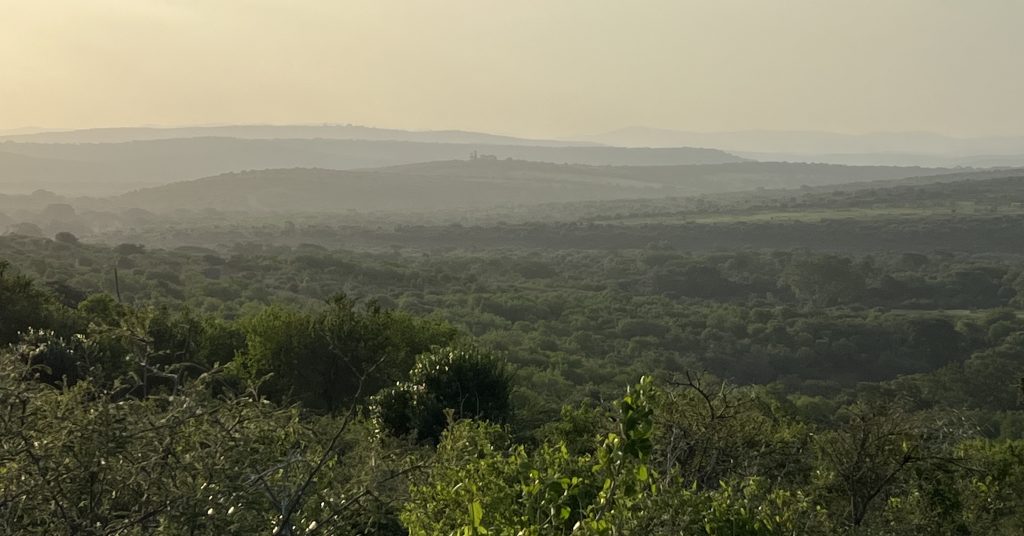
Andrew would be my guide for the next four days. With him I would explore the Thula Thula elephants about which I’d read a lot in Francoise’s book. Francoise herself wasn’t present, she was enjoying her annual vacation in Mauritius. On our game drives we were sometimes accompanied by two ladies who had been to Thula Thula before, yet most of the time it were just the two of us. I felt Andrew was happy about the fact that not so many people joined, because to say the least, he was not really a very social person. I don’t mean this in a negative way, he wasn’t unpolite or anythink like this, but I could clearly sense that he prefered being alone with his elephants than being around people. And honestly, I can relate to this 🙂 He had found something in the Thula Thula elephant herd which he hasn’t found in life: Calmness, peace, tranquility and family – and this he admitted almost in tears in one of our conversations.
I was with the right guy.
Andrew came to Thula Thula seven years ago. He had heard a lot about this herd and was eager to learn more about their social behaviour. After all, this herd was a very special herd. Before it arrived at the reserve in 1999 the herd was well-known for being difficult, aggressive and socially unbalanced. The elephants were considered a herd of ‘rogue’ wild animals and destined to be shot unless alternative arrangements could be made. Thula Thula became the “alternative arrangement – Lawrence Anthony the owner of the reserve and a well-known South African conservationist accepted the challenge to take over the herd. Anthony was a key figure in promoting the concept of joining tribal lands to game reserves in order to give remote tribal communities a vested interest in conservation. Lawrence and the herd, they went on a long journey of getting to know each other and Lawrence never got tired of pointing out how much he learned from them about life, loyalty and freedom. He has laid out beautifully his experiences of this journey in his book The Elephant Whisperer. By the time Andrew arrived at Thula Thula the herd was no longer considered ‘rogue’ but there was still much to explore about their social behaviour – and this is where Andrew stepped into Lawrence’s foot steps and this is why I was here.
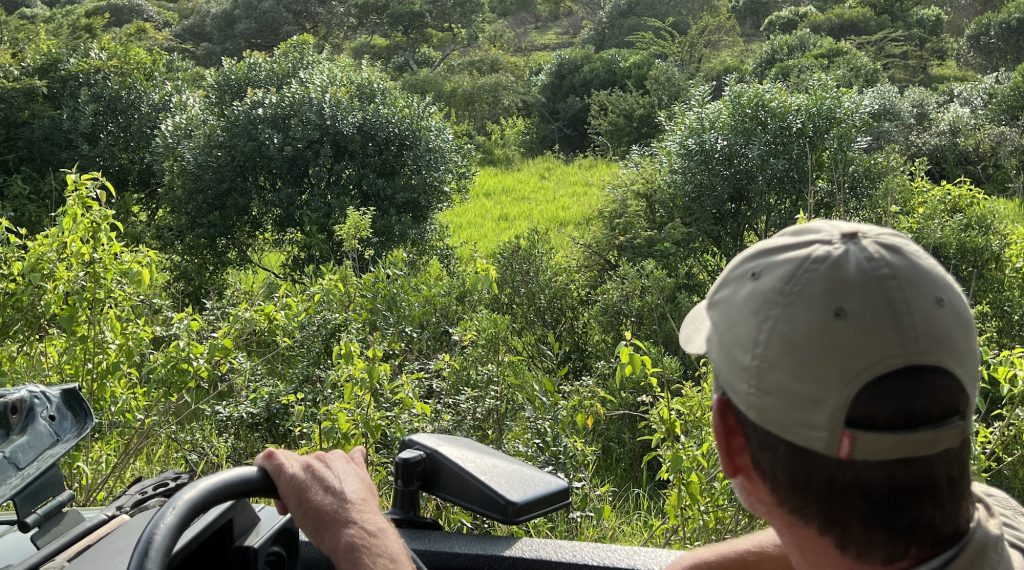
Nana throwing a tantrum
It was the day before the entire herd turned the dam into a whirl pool (video above). We had to drive far to finally find the elephants in the green gumhills of Thula Thula land. They were split in two groups. Andrew explained that sometimes Nana and her children Mandla, Nandi, Ivula, Indula and Lolo seperate from Marula’s family.
Nana was obviously on her way to catch up with Marula’s family while two of her children were way behind. Mandla, her oldest son, and Nandi, her oldest daughter, didn’t dare to follow her and just stayed behind. Nana had “called” them already a couple of times and showed clear signs of frustration. She was getting annoyed and let it play out – she threw a tantrum 🙂
Frustration over the lack of obedience within the family was that day on full display! These elephants have strong bonds and practice a complex social behaviour and simply act if something is not working out for them in the way they want it!
Eventualy the two started to move and followed her and we saw them the next day all together.
Mourning and Communicating
When Lawrence Anthony died in 2012 there were two herds of elephants at Thula Thula. From the original group of seven elephants in 1999 they had grown now to 29. The day after Lawrence’s death, the two herds reached his private house and for two days the herds loitered at his rural compound — obviously to say good-bye to the man who saved their lives. They showed their respect for about two days before making their way back into the bush. And every year at the anniversary of Lawrence’s death they come back, roam around and are simply there.
How did they know Lawrence died? And how do they know that another year is gone?
We simply don’t know, or as Lawrence has put it in his book The Elephant Whisperer – maybe the message is in the wind. What we do know is that elephants use these low-frequency sounds as a form of long-distance communication as they can travel further without being absorbed or reflected by the environment. These forms of elephant tele-communication are thought to carry up to 7km through dense forest and much further over open savannah. Researchers have found that elephants also appear to communicate by sensing seismic vibrations through the soft skin on the pads of their feet. Elephants may also lay their trunks on the ground to detect vibrations in the earth. One distinct behavior of elephants in the wild is synchronized freezing which I haven’t seen at Thula Thula but in Damaraland in Namibia, where the wild desert elphants roam around.
Elephants have long been known to mourn their dead and regarded for their ability to express emotion, even empathy. They come and have behavioral interactions with their dead in a form that is not explainable in any simple, evolutionary context – yet it speaks to the deeper emotional lives of elephants that we can’t easily study, scientists say.
Frankie, the matriarch of the herd, was the one leading her herd to Lawrence’s house when he had died. It was their relationship – Lawrence and Frankie – which finally broke the spell over the ‘rogue’ herd: When Andrew came to Thula Thula he approached the herd via Frankie – and just like Lawrence he developped a special relationship with her. He knew that Frankie wasn’t feeling well and that she had seperated herself from the herd. This wasn’t a good sign, yet it made it easier for the team to help. They darted her once for examination. The blood samples were pointing to a liver damage, they started some treatment and were hopeful she would recover. But in early January 2021 she disappeared and was only found dead a week later. The smell showed the way. She had gone into the deep thick forest and as a true leader had chosen to die alone.
The herd, Andrew said, was close by and they were fully aware what was happening – they accepted it and went on with their own life yet showing a deep sense of respect by revisiting the place where their former matriarch died.
Hierarchy
Elephants have a clear hierarchy – and this hierarchy is accepted by anyone. The martriarch of the herd has the say, she is the backbone of the family. When Frankie died in January 2021 the herd was in distress and it took a few month until Marula took over. Being the matriarch means being accepted by everyone as such. There was some back and forth going on between Mana and Marula, but finally Marula emerged as the new leader. She is now responsible for finding the best food places and water, sensing where danger is looming, finding the right ways to go, teaching the youngsters how to behave, defending the herd and protecting the babies. The latter all of them do as a group.
Among the males in the group Gobisa was brought into Thula Thula in 2018 to be the powerful father figure to keep the younger bulls in check and to balance out Mabula, who is ranked above him.
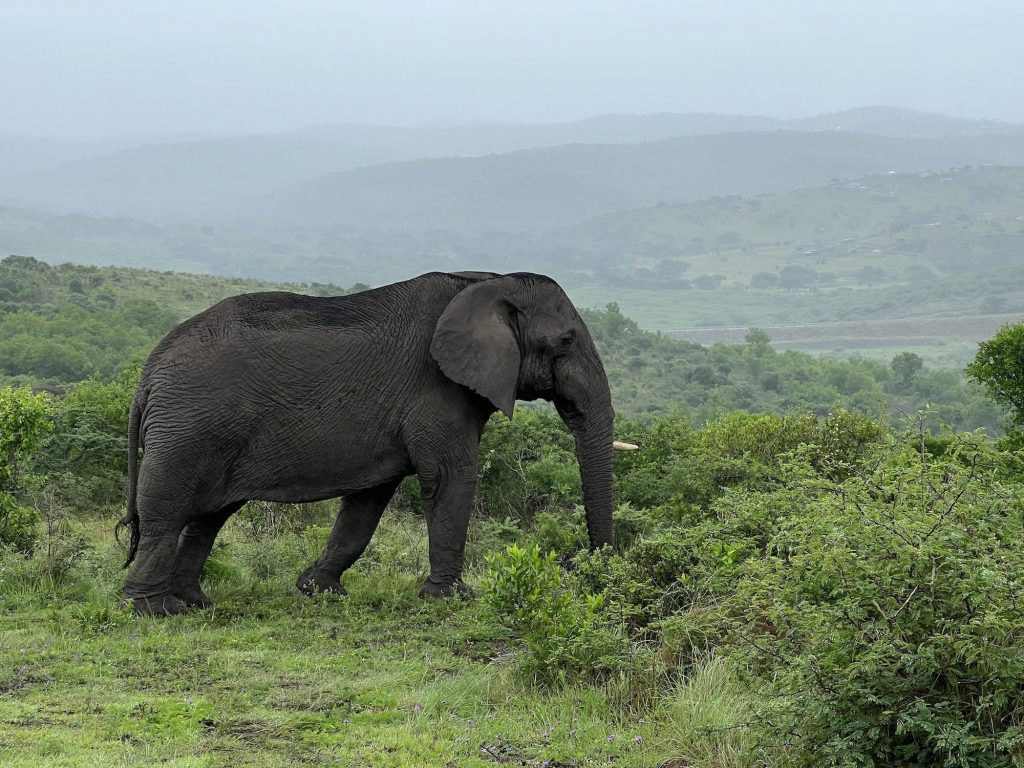
The younger bulls keep challenging him – and they also “fight” among each other, especially when they are in their musth. They get together with their buddies and do the elephant equivalent of arm-wrestling. They figure out dominance by fighting. This fighting can range from mild, playful pushing to raging battles to the death. There is much language and ritual involved with bulls approaching one another and indicating their intention. And poor Gobisa has to go through this over and over again with the Thula Thula bull team. The pecking order is always challenged.
Within a group, Andrew explained, the Thula Thula elephants always sort their issues out. They are forgiving, sensitive, compassionate and smart. They wait until things are sorted out – only then they come together again. Certainly something we can learn from them.
5 thoughts to “Thula Thula”
I can relate a lot to lovely story and the communication with the elephants. I had several encounters with them in my most beloved place on this wonderful world (my soul spot in Sri Lanka). I think we still know way too little about the animals. And sometimes I wonder, if just because we do the distinction between ‘human vs animal’ we do not close a major doorway to understanding.. just a thought (right now here looking at a crowd of ravens playfully dancing infront of my window) …
Dear Ulrike,
I was actually right there on this journey with you, what a delight it was to read this! I am certain you have a connection with these gentle giants. Right from the moment you spotted that book, to actually going ahead and experiencing it yourself – you had me engrossed. The videos, of course, were an added bonus. Thank you for sharing this.
Shail.
It was so heartwarming to read the story of the elephants of Thula Thula. The best part was seeing the elephants enjoy their bath time. It gave me a sense of utmost happiness. Now I want to swim as well. But amazing story and thank you for bringing this story to us.
ulrike..thank you for such a lovely account. The elephants video were so entertaining…. and as you travel these unknown parts of the world, i find myslef looking up …where is she.
i learnt today that i am totally zero on the history of africa. and after reading about nambibia and zulu land, was feeling so sad… colonialsim has done so much violence … .. and what really suprised me was that these countries which destroyed so much are seen as great and civilised. they are supposed to be a model …
this has really increased my interest in the decolonising work that is going on all over the world.
thank you ulrike for always opening my eyes to look further and further.
i hope you continue writing … it would be nice to get some background of the places you go to, so we dont have to look up google… also please do write every day , it can be short, but some pictures…. i do wake up hoping to see some more of your posts…but just the pictures are not enough. your wrriting makes in so alive, and i feel i am travelling with you as you explore ..
keep it up girl….
Oh, sometimes I wish I was an elephant – it’s alright if everyone fills their place